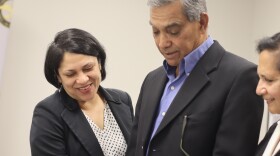Bowling Green is home to residents from dozens of countries, and schools where students speak about 90 different languages. One of the biggest challenges facing members of the city’s international community is the language barrier.
That can be especially true in the areas of healthcare and housing.
Navigating the many obstacles of finding a place to live in Bowling Green can be difficult enough for someone who’s a native of the area. Now imagine the challenges faced by someone who struggles to speak English.
That’s why Chiquita Sparks, with the Bowling Green Human Rights Commission, stresses the importance of international community members understanding the details involved in a housing lease. She said because leases are usually printed in English, and not other languages such as Swahili or French, it often makes it difficult for some local immigrants and refugees to understand what terms they’re agreeing to if, or when, they sign a lease.
“And with the language barrier, they got to have someone to translate for them, so they’ll understand what they’re signing, or what they’re getting into. You don’t want them being taken advantage of because they do not know,” she said.
Sparks said she has heard reports of landlords charging people in the international community for expensive repairs or replacements, even when the tenant hasn’t signed a rental agreement.
Interpreters also play a very important role in the world of healthcare, where a lack of communication can mean canceled appointments and delayed treatment. The International Center of Kentucky, a refugee resettlement agency based in Bowling Green, provides access to interpreters and can connect people with community resources for finding fair housing.
“But I think the biggest issue that we have is people requesting the service or not knowing that the service is available,” said Vanisha Stewart-Amoah, the Health and Wellness Case Manager at the International Center.
She said having an in-person interpreter can prevent communication mistakes between a patient and medical staff that might lead to improper care.
When someone who isn’t fluent in English goes to the doctor, that provider is required to make an interpreter available. It’s a right secured by the federal Civil Rights Act outlawing discrimination based on national origin.





